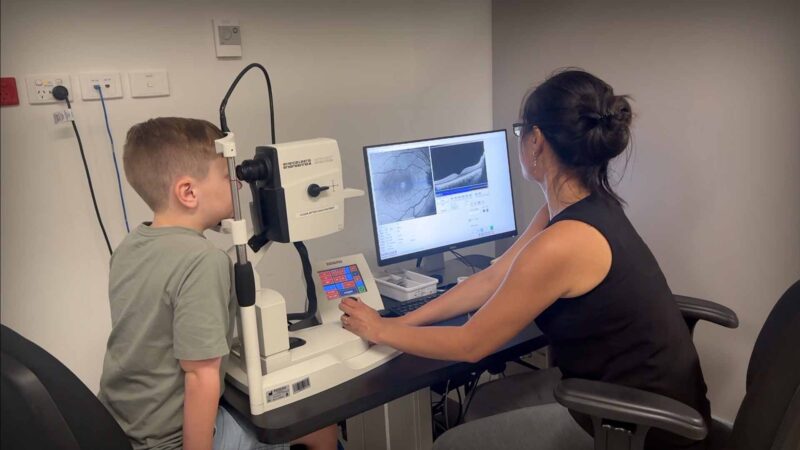PATHOGENICITY, MODELLING & TREATMENT OF INHERITED RETINAL STARGARDT DISEASE
Dr Di Huang
Research Associate
Lions Eye Institute, Nedlands, Western Australia
RESEARCHER PROFILE
Filmed in Perth, Australia | July 2025
Dr Di Huang is a Research Associate at the Lions Eye Institute (LEI), working with A/Professor Fred Chen and Dr Sam McLenachan. Her research focuses on developing a robust platform of retinal pigment epithelium cells and retinal organoids derived from patient-specific induced pluripotent stem cells to model inherited retinal diseases, particularly Stargardt disease (STGD1).
STGD1, caused by ABCA4 mutations, leads to progressive photoreceptor degeneration and vision loss. Dr Huang’s research investigates splice-switching antisense oligonucleotides (SS-AONs) as a therapeutic strategy. Unlike traditional gene replacement therapies, SS-AONs transiently modulate pre-mRNA splicing, offering a mutation-specific, reversible approach with potentially enhanced safety and efficacy.
Utilising patient-derived fibroblasts from the Western Australian Retinal Disease Study biobank, her team aims to characterise ABCA4 variants, elucidate disease mechanisms, and assess SS-AONs’ therapeutic potential through advanced molecular and functional analyses. This research seeks to refine genetic diagnoses, facilitate patient stratification for clinical trials, and advance precision medicine approaches for inherited retinal diseases.
Dr Huang completed her PhD at Murdoch University, through a scholarship awarded by the Perron Institute and Murdoch University before joining LEI. She has authored ten publications, seven as first author, and has had two abstracts published in the Association for Research in Vision and Ophthalmology conference proceedings. She has received multiple awards in 3-Minute Thesis competitions, including the Virtual Asia-Pacific competition. Her research is supported by Lions Eye Institute Strategic Funding (2023), Retina Australia (2024), and Australian Vision Research (2025).
Source: Supplied, and supplemented
You Might also like
-
Links investigated between poor sleep and onset of dementia
Watch Samantha Bramich, a PHD candidate at the Wicking Dementia Research and Education Centre, University of Tasmania talk on identify the prevalence of rapid eye movement sleep behaviour disorder (RBD) in Tasmania and how poor sleep contributes to the onset of dementia and other diseases.
-
CASE STUDY Role of Exercise in Metabolic Associated Fatty Liver Disease
Dr. Shelley Keating AES AEP* is an Accredited Exercise Physiologist, a researcher, and a senior lecturer at the School of Human Movement and Nutrition Sciences at the University of Queensland in Brisbane, Australia. Dr. Keating’s research primarily focuses on the role of exercise in the management of metabolic dysfunction associated steatotic liver disease (MASLD), previously known as non-alcoholic fatty liver disease. MASLD affects a significant portion of the global adult population, with many individuals unaware of their condition.
-
Genetics of the choroid and impact on eye health
Dr Samantha Lee is a Senior Research Fellow at Lions Eye Institute and the University of Western Australia. Dr Lee obtained her PhD in 2017 and the Queensland University of Technology and has since been working on the genetics and environmental causes of various eye diseases, with a focus on glaucoma and myopia. She has published 57 full-length scientific papers and her work has been cited over 1,000 times. She serves on the Editorial Board for the journal BMC Ophthalmology and Scientific Reports, and on the Research Advisory Committee for the Ophthalmic Research Institute of Australia.



